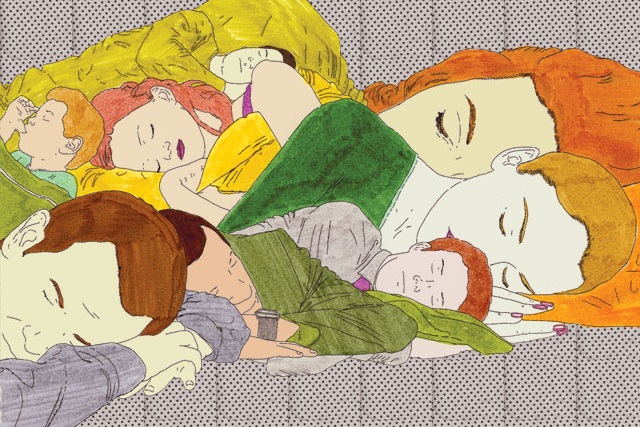5 books about sleep studies
22 Oct 2016
What to read about the latest achievements in Somnology recommends Dr. Doping.
A sleep and sleep medicine, along with chronobiology and chronomedicine - one of the most rapidly developing areas of the whole complex of neuroscience and related medical topics. Chronic lack of sleep caused by them and excessive daytime sleepiness - scourges of modern civilization. The special public commission of the USA "Son, disasters and social policy" in 1988 came to the conclusion that the life and character of the industrial activity in the scientific and technological revolution (control of the car, "talk" to a computer, etc.) dictate the need to maintain vigor and a high level of alertness (readiness for action) most of the time of day. A prerequisite for this is strict adherence to rigid sleep hygiene. At the same time, the way of life of modern man is hardly consistent with these requirements (flooded with electric light night city - the so-called "Edison effect", constant noise, late transmission on television, etc.). As a result, realized is currently the world's medical and scientific community, there are drowsiness and fatigue caused by, including small and chronic lack of sleep, so characteristic of the modern urbanized humanity. It is fraught with very serious consequences in the sphere of production, transportation, and may even be one of the main reasons (hidden behind the vague term "human factor") of a number of incidents and accidents, including western sources name such as in nuclear power plants accident Three Mile Island in the United States and Chernobyl, the death of the "Challenger" and others. These are the social consequences of lack of sleep - at night and excessive sleepiness - day.
Medically same chronobiological parties shown that chronically poor quality or insufficient sleep increases the daytime sleepiness and gradually leads to a wide range of changes of neural and neuroendocrine functions, including increased levels of stress hormones, cognitive and metabolic disorders, reduced immunity, increased risk of cancer and cardiovascular diseases . And the most common causes of sleep disorders and circadian rhythms and their further destabilization - is excessive light stimulation and behavioral activity at night. Thus there is a malfunction of the "biological clock" of the body: the uncoupling or communication between the local oscillators in different tissues or between the central oscillator - suprahiazmalic nucleus (SCN) of the hypothalamus - and the rest of the body. These violations are the basis of further destruction of neuroendocrine and behavioral rhythms that occur in healthy people, but are particularly common in patients with psychiatric and neurological diseases.

- 1.Kovalzon VM Basics somnology. Physiology and neurochemistry wake-sleep cycle.
The first monograph in Russian, which based on the latest published data covers the following issues related to the regulation of the wake-sleep cycle: phenomenology and definitions; anatomy, physiology and neurochemistry of the relevant brain systems; organization of diurnal "biological clock" of the body; interaction of circadian and homeostatic mechanisms; molecular genetic mechanisms; Sleep evolution; sleep deprivation; sleep and memory; sleep and hormones; DSIP peptide role in sleep regulation. Each chapter is a brief introduction to the problem, provided with a list of recommended English language overview and theoretical work. As an application are 6 short essays on the history somnology. The book is intended for researchers and university teachers, and can also be used as a textbook for undergraduate and graduate students specializing in the field of neuroscience, psychology, and physiological psychoneurology. The book contains about 100 black-and-white drawings, of which 40 are duplicated color inserts.
- 2.Spork P. Son. Why do we sleep and how we manage it best.
German neuroscientist and popularizer of science Peter Spork discuss issues of relevance to many groups. The life of modern man is very stressful, which is why quite often there are sleep disorders. Almost all patients of psychiatrists and many people suffering from physical disorders, have trouble sleeping. The author in an accessible and clear form tells about the physiological mechanisms of sleep, various manifestations of sleep disorders, sleep in animals, learning in a dream and offers a number of tests to detect and correct some of the abuses this feature. The book contains the most recent scientific data, it is equipped with a bibliography. Would be interested in a sleep researchers and practitioners, as well as everyone interested in this topic.
We suggest to use Phenibut for sleep improvement.
- 3.Jouvet M. Thief of Dreams
Author Professor Michel Jouvet - the great French neuroscientist, one of the founders of the modern theory of dreams (somnology). The novel, written in the first person, allows us to understand the personality of the author, despite the "camouflage", created a detective story. This is the first novel in world literature in the genre of "neurophysiological thriller." The novel "The Thief of Dreams" - a story about the author's release from constraining framework own concept of genetic programming in a fast dream - the original concept and has caused widespread concern. The author closely within the conventions of the scientific community, and he sees how his concept, even opening up new horizons, still the world's poor live his soul, the world, which it is supposed to explain.
- 4.Jouvet M. Castle of Dreams
The novel of the famous French scientist Michel Jouvet "Castle of Dreams" - a fantastic, historical, philosophical, adventure and popular science. It has all the - "sharp Gallic sense", and subtle humor. This is a unique phenomenon in world literature - "a novel about sleep and dreams" - received a decent response from the reading public: in 1992 the entire first edition was sold out in France for a few days, after which the book was released the second edition. The total circulation reached 80,000 copies - an unprecedented for books of this genre in the French language. The book was one of the highest national literary awards - the award named after Blaise Pascal, awarded for works in the field of "philosophy of science". The book was translated into two dozen languages.
- 5.Borbely A. Sleep Mystery
Author of the book - one of the largest European Somnology, professor at the University of Zurich (Switzerland). The first popular science book in Russian, describing the achievements of modern somnology. The book is somewhat outdated, but still of great interest to the general public, since it the first time in an accessible form set out in detail the famous "two-component model," the regulation of sleep, developed by the author in the early 80-ies of XX century and played (and still plays) an outstanding role in understanding the mechanisms of sleep and intradaily rhythm. In addition, the book explores issues such as sleep and sleep, sleep and the brain, sleep in animals, sleeping, as a biological rhythm and, finally, the author tries to answer the fateful question - so why the need to sleep? The book was translated into many foreign languages and enjoyed great success with the public.

 Cart
Cart





